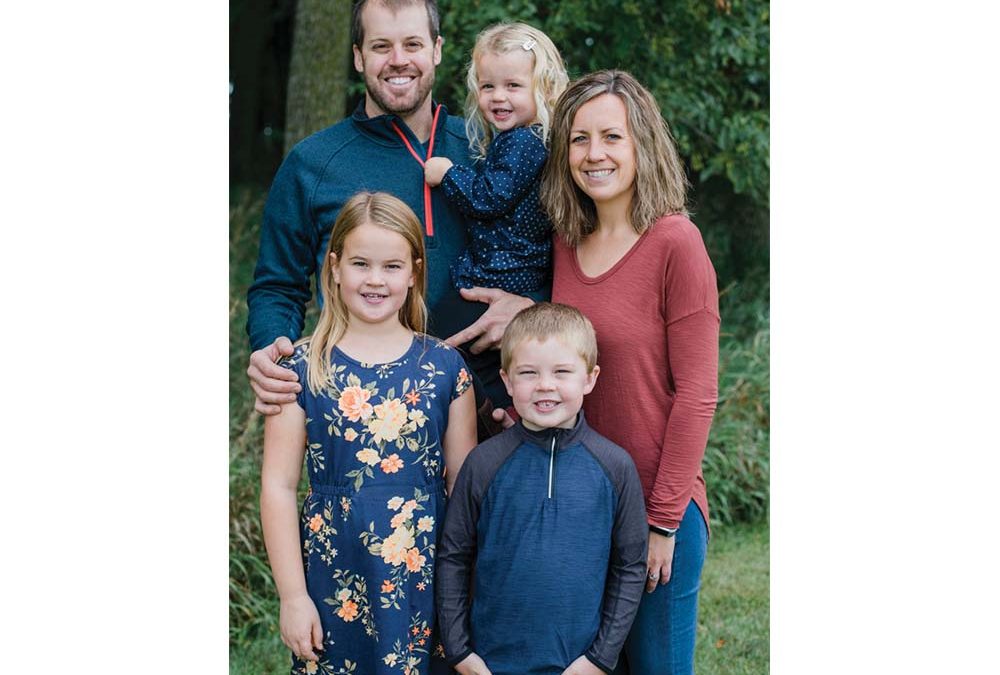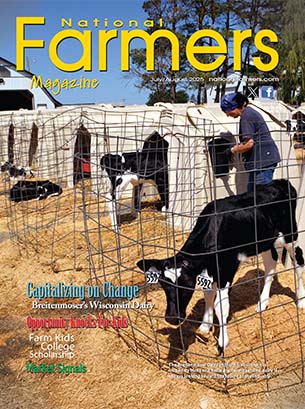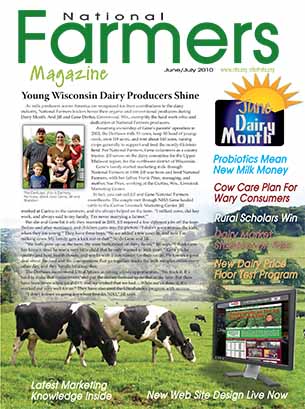South Dakota Organic Producer Follows In Elder’s Footsteps
By Denice Rackley
Aaron Johnson says organic farming is all he has ever known. Thankful to be continuing the organic farming traditions that began in Madison, South Dakota, with his mom and dad, aunt and uncle, Johnson, and his wife Kristin, are raising their three children, Anika, 10, Anthony, 8, and Leah, 4, on the same land and in the same house where he grew up.
Transitioning to Organic
“My dad, William, and Uncle Bernie Johnson were farming together traditionally in and around Madison before I was born,” Johnson said. “Uncle Bernie and dad were introduced to organic farming in the early 70s.” His dad required a bit of convincing to give up the convenience of eradicating weeds from crop fields using chemical sprays.
“The story goes that dad dug in his heels a bit because spraying weeds was easy and effective. However, my uncle was positive that traditional farming practices were harming the land,” Johnson emphasized. You have to remember back then they were using some pretty toxic chemicals. “He told my dad that morally he didn’t have the right to use those chemicals on the land,” Johnson said.
The Johnson farms transitioned to organic in 1973 and were certified organic in 1976. “I remember years later, dad was asked why he farmed organically. His answer was simple and profound–‘Thou shall not kill.’ He understood what has been proven; chemicals kill more than weeds. Vital life within soils is also harmed,” said Johnson.
Bernie’s kids, Charlie and Allan, took over farming for their dad in the early 80s. They continued farming organically, renting Aaron’s parents’ farm and other farm ground, while Aaron was going to school and in college at South Dakota State University. “In 2009, I joined Charlie and Allan, farming with them as an employee,” he said.
Two years passed with his cousins acting as mentors and the three of them farming nearly 2,000 acres, along with having a beef cattle herd when Aaron became a partner in Johnson Farms.

Johnson bales the 30-foot buffer strips that separate their organic fields from neighbors’ land. “Cattle graze land not suitable for crops and eat our mistakes,” Johnson said, jokingly. “Our crop fields are on a 6-year rotation, producing 4 different cash crops and one cover crop.” The first-year oats are planted with alfalfa under seeded. Oats are harvested in the fall, and the next year the alfalfa is baled. “We can harvest three cuttings of organic alfalfa in a year,” Johnson stressed.
Year three, the organic alfalfa is again baled, then tilled in the fall to plant soybeans the next spring. Once soybeans are harvested, winter rye is chisel plowed in. The fifth year the rye is allowed to grow to six to eight inches tall, then is field cultivated in the spring. The rye serves as green manure for the corn crop planted that spring. The sixth year, soybeans are planted again, then the rotation starts over.
“The rotation adds nutrients to the soil for the next crop, reduces weed and pest pressure,” Johnson explained. In addition to cattle manure added to the fields and the cover plowed in, the Johnsons utilize certified organic pelletized poultry litter that is readily accessible and delivered to their farm.
While the cousins continue to farm together, sharing machinery and often working as a team during harvest, Aaron was pushed from the nest to begin farming his parents’ land on his own in 2014. “It was a bit scary at first, but I am glad my cousins encouraged me to do it,” Johnson said.
Marketing Is the Easy Part
“The easiest part of organic farming is the marketing with National Farmers Organization,” Johnson said. “My dad was an organizer. We have been proud card-carrying members since 1961.”
“A friend told me that he has 20 percent of his time tied up with marketing,” Johnson said. “Once I fill out the paperwork and sign the contract, I don’t worry about marketing. I trust National Farmers’ ability to take care of that for me,” said Johnson.
“I have a great relationship with our marketing agent, Mike Schulist,” he said. “We talk all the time. He has become a good friend.”
The Johnsons don’t own a semi, which is standard equipment for most grain farmers to haul their grain to market. Instead, they have a gravity wagon pulled by their tractors which are needed throughout the year anyway. This saves them money on additional machinery, fuel and repairs, hauling grain, waiting in line to unload, and time spent marketing. “National Farmers Organization takes all that off my plate and allows me to concentrate on things I am good at–growing crops,” he said.
“Once our grain is in our bins, we sit back and wait for the phone to ring.” .










